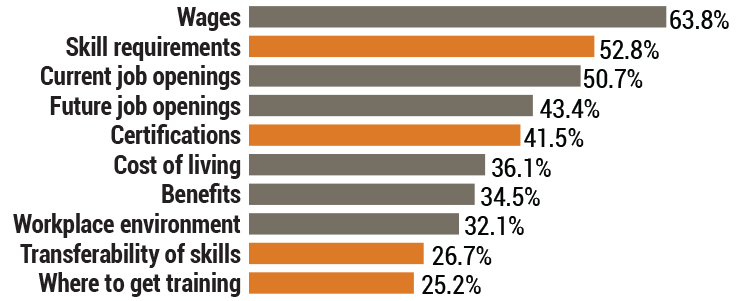
Amplifying the Impact of Data
Last week I had the pleasure of speaking at the Hot Topics Luncheon at Amplify 2019, an annual conference hosted by FirstWork, Ontario’s Youth Employment Network. Amplify provides an opportunity to bring together leaders from a wide variety of front-line organizations that provide labour market information (LMI), guidance, and advice to youth and other job seekers in the province.
This year’s theme “Collaborative Leadership / Collaborative Solutions” aligned with LMIC’s goal of providing timely, reliable, and accessible LMI to Canadians. We can’t do this alone. Employment service providers translate the labour market data and insights that LMIC produces into personalized guidance. Working closely with our network of intermediaries — between the data and the people — is essential to supporting Canadians in making more informed decisions about career pathways, education, and training.
At Amplify, I discussed some of the key insights related to the LMI needs identified by current college and university students. For students in Ontario, the skill requirements of jobs ranked second only to wages as the most frequently cited LMI need. As can be seen in the chart below, several other skill-related needs were also identified by students, including certification requirements, the transferability of skills, and where to get training.
Figure 1: Top LMI Needs of College and University Students in Ontario

Note: Respondents were asked to select from a set of 14 types of information they might seek when making a career-related decision. The percentages reflect the share of respondents who selected that answer. The orange boxes indicate responses that closely relate to skills information.
These findings support previous findings that skills information represents one of the largest LMI gaps in Canada. Our recent work with LinkedIn is helping to shed light on the skills demanded by employers, but more work needs to be done. To that end, we are exploring partnerships and pathways to develop clear definitions, categorizations and, ultimately, measurement of skills specific to the Canadian context. Such efforts, we hope, will bring clarity for how policy makers can best tackle skills and labour shortages.
Yet, the collection and analysis of skills-related and other labour market data would be purely academic if our insights didn’t reach the people who need them. This is why we launched our public opinion research, to identify the most valuable information and resources people seek out to inform their career, education, and training decisions. This feedback and advice from the ultimate users of LMI will help us continuously improve to ensure that we are meeting the labour market information needs of Canadians.

Tony Bonen is LMIC’s Director, Research, Data and Analytics. He leads LMIC’s team of economists, investigating everything from Canada’s diverse labour market information needs to the potential implications of the changing nature of the world of work.